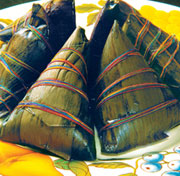May:Dragon Boat Festival(端午节)
(单词翻译:单击)
|
5th day of the 5th lunar month |
|||
The Dragon Boat Festival, also called the Duanwu Festival, is celebrated1 on the fifth day of the fifth month according to the Chinese calendar. For thousands of years, the festival has been marked by eating zong zi (glutinous2 rice(糯米)wrapped to form a pyramid using bamboo or reed leaves) and racing3 dragon boats. The festival is best known for its dragon-boat races, especially in the southern provinces where there are many rivers and lakes. Thisregatta(赛舟会)commemorates the death of Qu Yuan , an honest minister who is said to have committed suicide by drowning himself in a river.
The people of Chu who mourned the death of Qu threw rice into the river to feed his ghost every year on the fifth day of the fifth month. But one year, the spirit of Qu appeared and told the mourners that a hugereptile(爬行动物)in the river had stolen the rice. The spirit then advised them to wrap the rice in silk and bind8 it with five different-colored threads before tossing it into the river.
A wooden dragon head is attached at the bow, and a dragon tail at thestern(船尾). A banner hoisted11 on a pole is also fastened at the stern and the hull12 is decorated with red, green and blue scales edged in gold. In the center of the boat is a canopied13 shrine14 behind which the drummers,gong(铜锣)beaters andcymbal(铙钹)players are seated to set the pace for the paddlers. There are also men positioned at the bow to set off firecrackers, toss rice into the water and pretend to be looking for Qu. All of the noise and pageantry creates an atmosphere of gaiety and excitement for the participants and spectators alike. The races are held among different clans15, villages and organizations, and the winners are awarded medals, banners, jugs16 of wine and festive17 meals.
|
 收听单词发音
收听单词发音
1
celebrated

|
|
| adj.有名的,声誉卓著的 | |
参考例句: |
|
|
|
2
glutinous

|
|
| adj.粘的,胶状的 | |
参考例句: |
|
|
|
3
racing

|
|
| n.竞赛,赛马;adj.竞赛用的,赛马用的 | |
参考例句: |
|
|
|
4
situated

|
|
| adj.坐落在...的,处于某种境地的 | |
参考例句: |
|
|
|
5
esteemed

|
|
| adj.受人尊敬的v.尊敬( esteem的过去式和过去分词 );敬重;认为;以为 | |
参考例句: |
|
|
|
6
corrupt

|
|
| v.贿赂,收买;adj.腐败的,贪污的 | |
参考例句: |
|
|
|
7
vilified

|
|
| v.中伤,诽谤( vilify的过去式和过去分词 ) | |
参考例句: |
|
|
|
8
bind

|
|
| vt.捆,包扎;装订;约束;使凝固;vi.变硬 | |
参考例句: |
|
|
|
9
symbolize

|
|
| vt.作为...的象征,用符号代表 | |
参考例句: |
|
|
|
10
yolk

|
|
| n.蛋黄,卵黄 | |
参考例句: |
|
|
|
11
hoisted

|
|
| 把…吊起,升起( hoist的过去式和过去分词 ) | |
参考例句: |
|
|
|
12
hull

|
|
| n.船身;(果、实等的)外壳;vt.去(谷物等)壳 | |
参考例句: |
|
|
|
13
canopied

|
|
| adj. 遮有天篷的 | |
参考例句: |
|
|
|
14
shrine

|
|
| n.圣地,神龛,庙;v.将...置于神龛内,把...奉为神圣 | |
参考例句: |
|
|
|
15
clans

|
|
| 宗族( clan的名词复数 ); 氏族; 庞大的家族; 宗派 | |
参考例句: |
|
|
|
16
jugs

|
|
| (有柄及小口的)水壶( jug的名词复数 ) | |
参考例句: |
|
|
|
17
festive

|
|
| adj.欢宴的,节日的 | |
参考例句: |
|
|
|


 Qu was a minister of the State of Chu
Qu was a minister of the State of Chu  During the Duanwu Festival, a glutinous rice pudding called zong zi is eaten to
During the Duanwu Festival, a glutinous rice pudding called zong zi is eaten to 



